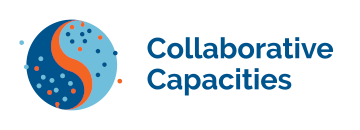Hosted by UKRI’s Arts and Humanities Research Council and the Future Generations Commissioner for Wales, Collaborative Capacities facilitated a consultation event to explore initial steps towards embedding Intergenerational Justice in the design and implementation of everyday work.
This one day cross-sector hybrid (online and in person) event took place in Cardiff and was attended by delegates from a wide range of organisations, backgrounds and career stages, including academics, practitioners, NGOs concerned with intergenerational dialogues, and the public sector. Equal numbers participated online and in person, with the online group feeling fully included by projecting the Zoom screen on a large screen in the room. We had a simultaneous Cymraeg translator (Cymen) and had conducted a full accessibility review prior to the day.
Our approach for the day was energetic and creative, using a mixture of short keynotes, activities based on scenarios, and plenty of room and time for discussion. Delegates were invited to meet and learn from each other throughout the day, and the activities encouraged them to broaden their thinking then converge towards agreed outcomes. There was unanimous agreement that the impact of Intergenerational Justice will depend on being able to hear, validate and incorporate all perspectives, with the recognition that there might be voices who are missing. Future impact will grow as we support knowledge and agency of different communities to manage uncertainty and allow collective endeavour to inspire action.
The impact statement that resulted from the day was a strong testament to the depth of the discussions:
The impact that we want intergenerational justice to have is
to achieve an environment in which those with privilege and power
act to break down unchallenged and unjust power structures
to leave the world better than they found it
and encourage others to do the same.
There was a feeling that many of the actions from the day, particularly in the short-medium term, are achievable through changing our ways of working. A full report was submitted to the AHRC summarising the ideas and outlining possible next steps.
More about this work can be found on the AHRC’s blog about intergenerational justice at this link.
Participant testimonials:
“This was by far the best hybrid event we have engaged in”
“Such rich discussions – the scenarios were powerful”
“Some of the best facilitation I have seen, expertly including the online group in all the discussions”
Client testimonial:
“I just wanted to drop you a quick line to say, on behalf of us all at AHRC, thank you so much for all your incredible hard work in the build-up to yesterday’s event. It was a really rich, creative and thought-provoking day and I think all would agree that we wouldn’t have come remotely close to getting the invaluable responses and outputs from yesterday’s discussion without your help. The scenarios were a really inspiring way to tackle this huge theme and I think the exercise really resonated with people in the room and online. The event was a great success and it is thanks to your creative and innovative shaping of the individual sessions and the day as a whole, that made it possible .
[In addition, we were] very impressed with the content [of the final report], and is exactly what we were after if not more so” – Dr James Fenner, Senior Investment Manager – Heritage, Culture and Creative Arts, Arts and Humanities Research Council

